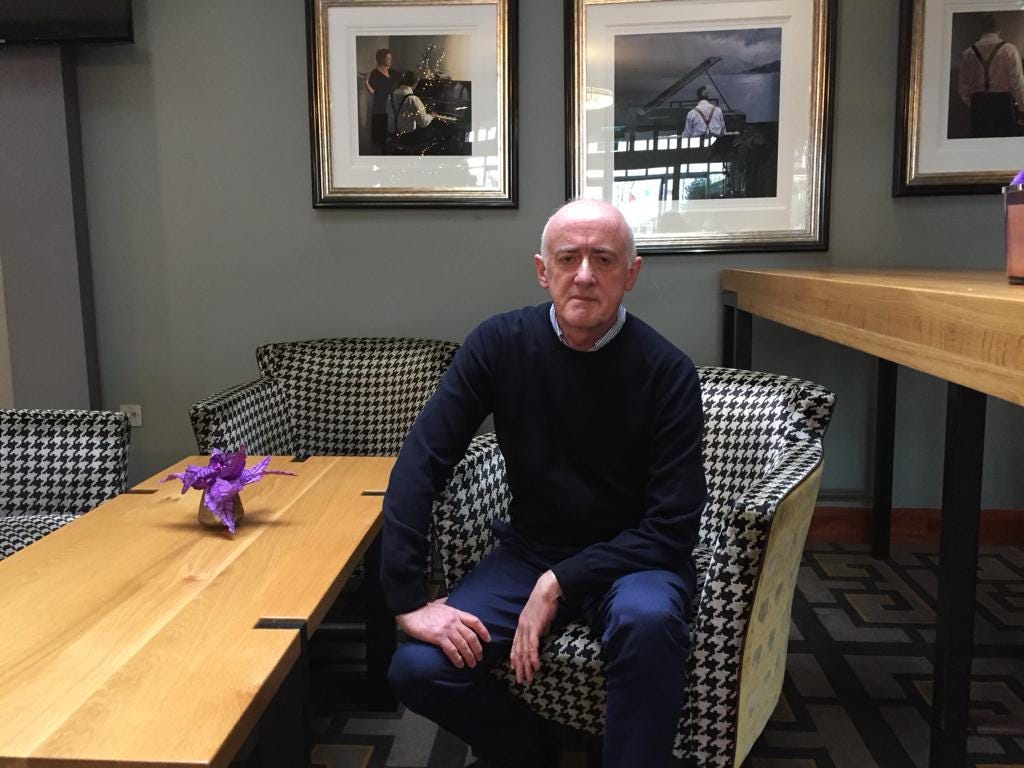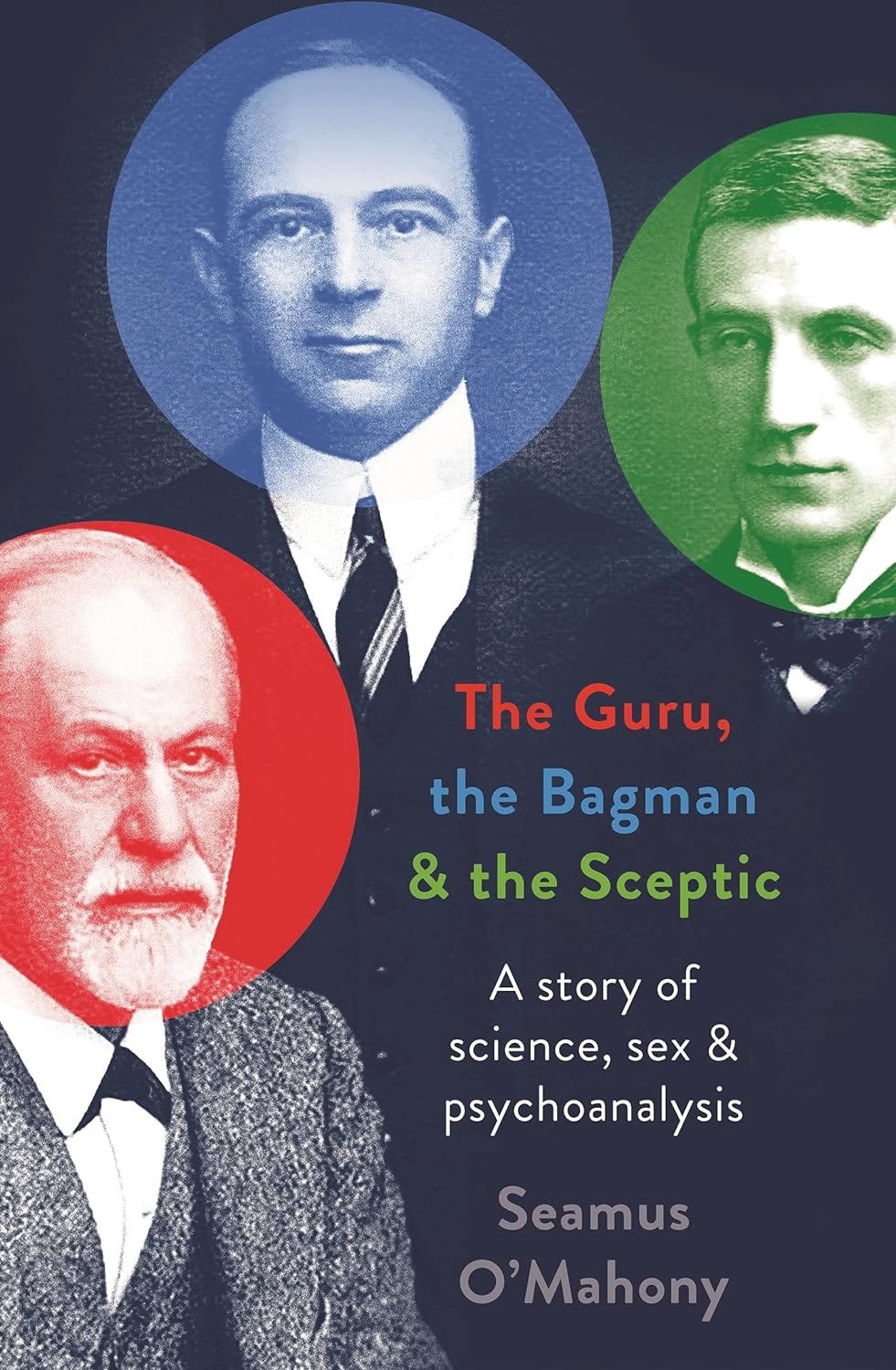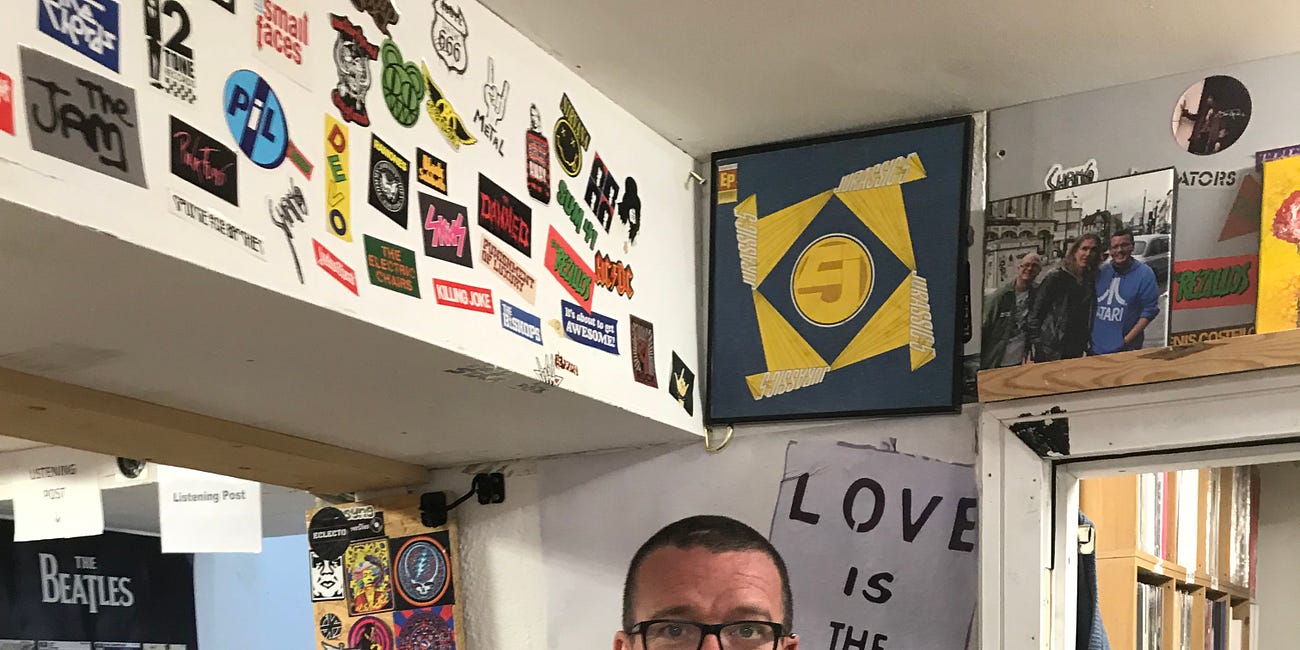What the doctor did next
After a long career in medicine, Seamus O’Mahony switched lanes to become a writer. How we live and die, and the institution of medicine inform his writing. As does a deep-rooted skepticism.
On a cold Friday evening in February 2020, Seamus O’Mahony pulled out of the staff car park in Cork University Hospital for the last time. Between studying and practicing, he had been involved in medicine in both the UK and in Ireland for over forty years and was now retiring to concentrate on his writing. In truth, the medical system had worn him down and he was glad to be leaving.
“When you enter the medical profession, you’re almost entering the priesthood and you really have to buy into the mission, you have to buy into a belief system around what medicine does, you have to buy into the power structures, into medical research…it’s very difficult to be a doctor without buying into all of this.
“I spent more than two decades as a fully paid up member of that mission, of that religion and for various reasons, found myself questioning everything.”
As the years went by, working long days, being on call, life in the hospital - the mission became increasingly difficult.
“I found myself very often having very difficult conversations with families and doctors saying I don’t think this patient will benefit from this procedure and there was a sort of subliminal message to me, well we don’t care what you think actually, we’d rather you just trot along like a good chap and just do it.”
A change of direction came from an unexpected source. A few years before he retired, a friend asked him to give a talk about death and dying, and end of life within acute hospital settings, to a conference of intensive care doctors held every year in Dingle. This was a topic he had a lot to say about and so he threw himself into the project wholeheartedly, developing what he described as “an obsession with end of life care in acute hospitals.”
“And as I started to do this I realised what I wanted to say was way beyond the remit of a medical journal and what I wanted to do was reach a general readership.”
The conference went ahead as planned in Dingle, but the day didn’t go as expected.
“By the time I got up to speak there were about 10 or 12 people in the room and I put this huge effort into this talk about death or dying and I thought this was too good, or not too good, but I thought, ‘Well, I should try to make something more out of it.’”
Making more out of it, as he says himself, developed into his first book, The Way We Die Now, published in 2016 and was followed in 2019 by Can Medicine be Cured?, a book that aims to debunk a lot of the fallacies that drive modern medicine, but which led to people in the medical profession to accuse him of arrogance and moving outside the remit of what a doctor should and shouldn’t say.
Writing in the BMJ, Richard Smith said Can Medicine be Cured? was “the most devastating critique of medicine since Medical Nemesis by Ivan Illich in 1975.”
“For me to even enter discussions about the existential or ethical aspects…people viewed it as slightly bad form.
“To even question the fact that you should be more than a technician was arrogant…I thought this was extraordinary.”
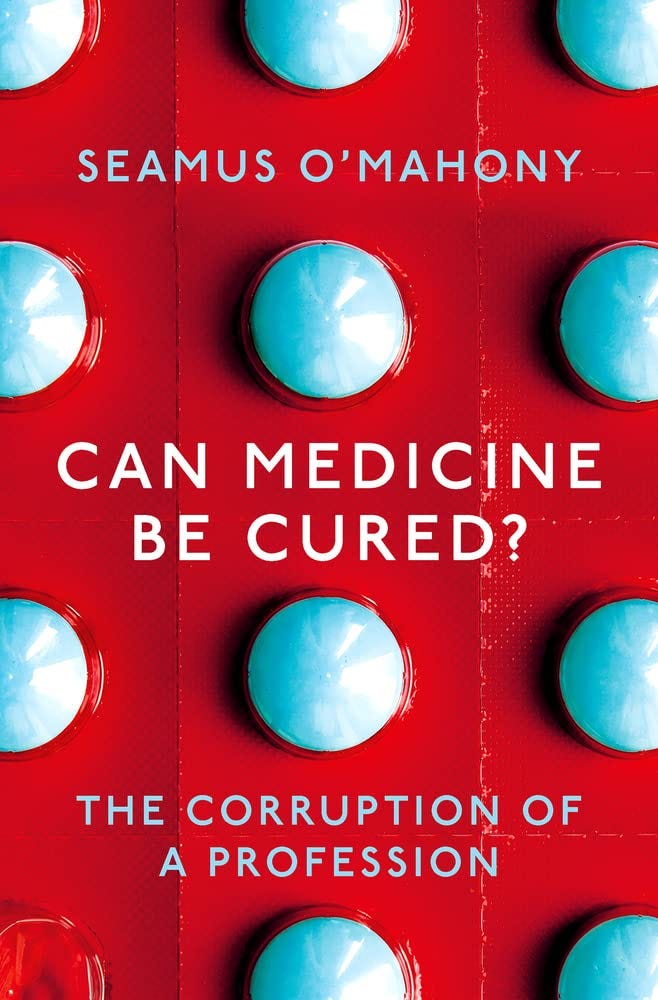
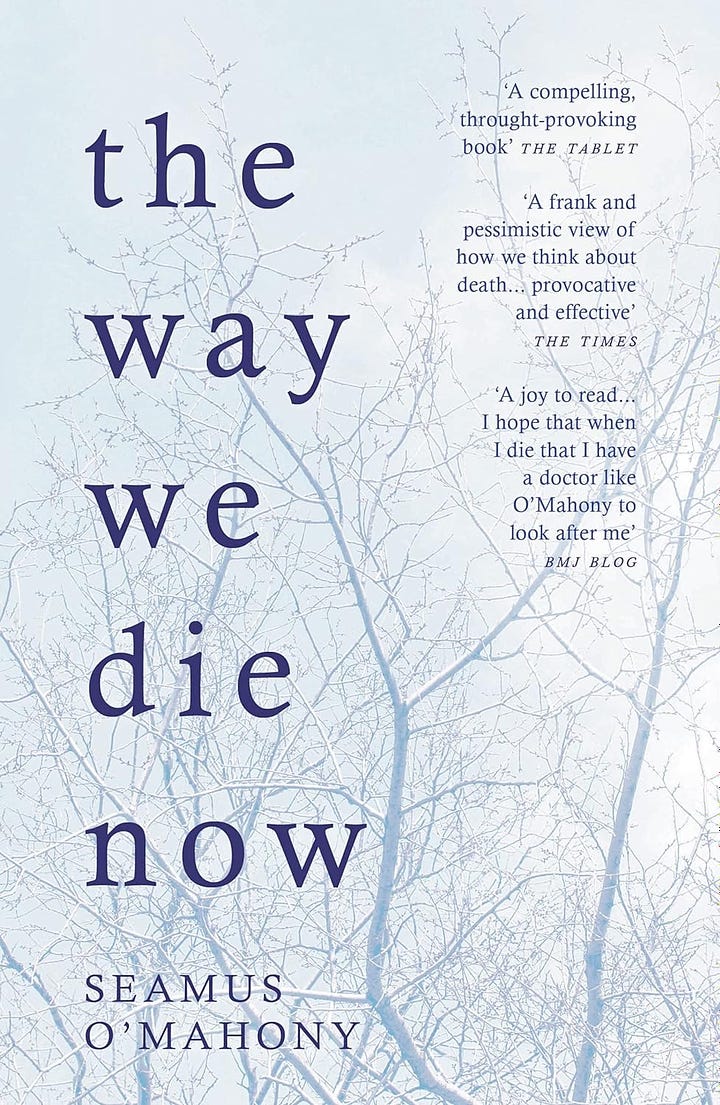
His third book, The Ministry of Bodies is a diary of his last year as a doctor and describes the squalor and chaos of acute general hospitals, the in-fighting and posturing of those in medicine, and the people who, the general public put their trust in everyday.
“Medicine has become very splintered, especially hospital medicine and what’s happened in Ireland particularly, when you have such a disastrously bad acute hospital system, is that instead of uniting the medical profession, it has splintered.
“We spend a lot of money on health in this country and we get very bad value for money.
“Mary Harney (the then Minister for Health) called it a national emergency 20 years ago when there were far fewer people on trolleys than there are now.”
Why hasn’t anything been done about this? Why is the health system in Ireland so drastically in need of an overhaul?
“There is no political will and the general public never pushed it high up enough in the political agenda for the politicians to do anything. And this “winter crisis” is used every year for the HSE and the Minister for Health to go to the department for finance and say we need another 20 million just to pull ourselves through the winter, so there’s the feeling that this is all kind of acceptable.”
It wasn’t always this way. He remembers when he first started working in the newly built hospital, The Wilton Hilton, as it was known at the time.
“There was a different culture when the place opened. There was strong leadership…the professors did not view their role as leading a vast research group and bringing in multiple millions in grant money…back then their main job was teaching and leadership…they kept people in line.
“But when that model disappeared, it was like Yugoslavia after Tito died.”
This mayhem led in the last few years of his working life to him adopting an absurdist attitude as a means of just getting through each day. When he entered the hospital grounds his first thought was, “how am I going to survive…and this leads to the most viscous squabbling…a kind of professional shithousery emerges as the dominant culture of the institution…it’s how can I protect myself and my department and that has implications for everything.”
But no sooner was he out the door of C.U.H., than he was almost immediately drawn back in. A month after he had retired, Covid had entered the public consciousness.
“I did go back to work in the vaccination programme in West Cork.”
But while there he was met with a lot of aggressive behavior from people and was convinced he “had made the right decision” in retiring.
Like a lot of people at that time, he wasn’t quite sure what to think or believe regarding the virus. When he used to go out walking near to where he lives in Macroom, his neighbors used to stop and ask his opinion about what was going on, but he wasn’t quite sure what to say.
“I spent all my career as a gastroenterologist, my knowledge of this is no greater than any other reasonably informed layperson. There were a very, very small number of people that I might’ve listened to, who had experience of managing viral epidemics, and they wheeled out immunologists! Immunology has got no insight into the management of a pandemic, so the understanding of both science and particularly of what scientific expertise was about was laughable.
“I know for a fact C.U.H. was half empty in the first year of Covid…people stopped turning up at the E.D.”
The way in which science was elevated in the public domain didn’t sit well with him either.
“The amount of nonsense spoken in the name of science was astonishing.
“Science is all about doubt, but there was no clear science to follow.”
Discussing this further, he mentions the example of the UK, where Patrick Valance, was Chief Medical Officer at the time.
“Patrick Valance’s background was in academic medicine where he specialised in endothelial biology, he then went off and jumped ship into big pharma for a decade. So he had no special expertise in the management of a pandemic, yet he was presented as, here is the face of science.”
As for the aftermath of that period and how it has impacted the health system in this country.
“We’re now seeing the effects of lockdown in a major way.
“Everything I described pre-Covid is now way worse in terms of waiting lists, trolley counts, missed diagnoses etc.”


But he’s no longer a part of that world. He is no longer working in an acute general hospital or vaccination centre and has more time to write. This is a good thing, when he has a project to work on and when the work is flowing, but he’s not so sure anymore if he is suited to a fully contemplative life.
“Sitting at home writing is incredibly hard as a life…I think it’s fine when you’re completely focused on a book…but as a way of life, this is a terrible life…it’s no wonder so many of them take to drink and so many other things.”
His passion for writing and books though, is obvious. It’s clear that he reads a lot and is at his most animated when discussing writers and their work, but outside of his literary interests he also finds time to relax.
“I love music, I play guitar and piano, not at any high level at all, I played for a long time just with a bunch of friends and it was a great release, it was actually quite transcendent at times and I think people who have music in their lives have a great gift.”
As for what the future holds, he’s not quite sure. His most recent book, The Guru, The Bagman and The Sceptic was released in February last year and is about the intertwined lives of psychoanalyst Ernest Jones, surgeon Wilfred Trotter and the guru of psychoanalysis, Sigmund Freud. He’s a little disappointed by the lack of attention it has received here in Ireland, but thinks it is his best work so far, as it is the “ideal confluence of my background in medicine, my literary interests and my absurdist approach.”
“It’ll give you a break, it’ll give you a laugh, and you’ll learn a lot about psychoanalysis and you’ll be entertained.”
Unfortunately for now, sales have been a little slower than expected, but the paperback version will be out soon so there’s time yet to attain what he is striving for.
“It didn’t kick off up to the next level. Momentum for me means that the next book is easier to be published…it doesn’t mean money, it doesn’t mean fame.
“If you write, you want as big an audience as possible. I have a decent readership but there’s a kind of level where it’s difficult to get up to and I don’t know how that’s achieved. You want momentum as a writer and gaining that momentum is useful when approaching a publisher.”
Hinting at a possible subject matter of what he’ll be approaching that publisher with, leads to a brief chat about the German philosopher Ludwig Wittgenstein, a man who lived many different lives. Like Seamus, he started out on one path and found himself going in another, completely different direction.
“You have to find the meaning, it can’t be handed to you, we are not one but multiple personalities over a lifetime and have to try to find a meaning as best you can.”
You can find out more about Seamus O’Mahony and his books here.
Pádraig O’Connor is a writer based in Cork City.




